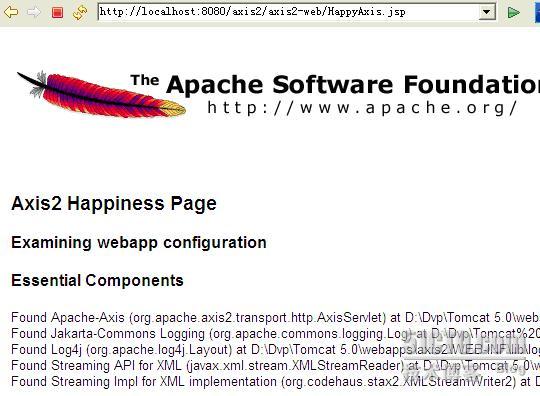zz基于Tomcat5.0和Axis2开发Web Service应用实例
版权声明:原创作品,允许转载,转载时请务必以超链接形式标明文章 原始出处 、作者信息和本声明。否则将追究法律责任。http://zhangjunhd.51cto.com/113473/23690
本文将介绍如何使用Tomcat5.0和Apache Axis2开发、部署及测试一个简单的Web Service应用。
1.工作环境
Eclipse Java EE for Web Developers
JDK1.6
apache-tomcat-6.0.20
axis2:1.5(war版本和bin版本)
下载AXIS2的Binary Distribution和war Distribution,把这两个文件解压,
比如解压缩的后得目录为C:\axis2-bin和C:\axis2.war。
在Eclipse下通过菜单window—preferences…--Java—Build Path—User Libraries 新建一个user library,比如名字就叫axis2把C:\axis2-std-1.0-bin\lib下的所有jar文件包含进来。把axis2.war拷贝到%TOMCAT-HOME%/webapps下面。
2.检验安装
在Eclipse下启动Tomcat,在地址栏内输入http://localhost:8080/axis2/。

点击Validate,将到达 Axis2 Happiness Page。

3.WebService中的HelloWorld
1)新建一个动态web工程,取名ZZaxis,右键点击项目名,选择Properties-Java Build Path-Add Library-User Library-axis2。
2)新建package sample,建立HelloWorld.java,代码如下。
HelloWorld.java
3)在WebContent\META-INF\建立services.xml,代码如下。
services.xml
4)将目录sample和目录META-INF组织如下(新建目录example)。
+-example
|-------- +-sample
|------- HelloWorld.class
|---------+-META-INF
|------- services.xml
5)打包生成aar文件。
在命令符环境下,将当前目录转到example。
jar cvf HelloWorld.aar . //注意最后一个点,在当前目录下生成HelloWorld.aar。

6)在Eclipse中启动Tomcat,在地址栏下键入http://localhost:8080/axis2/。选择Administration,输入用户名admin,密码axis2。选择左侧工具栏Tools- Upload Service,上传之前打包的HelloWorld.aar。该文件将在<catalina_home></catalina_home>/webapps/axis2\WEB-INF\services目录下。
7)编写客户端检验代码。新建Java Project,取名为ZZaxisClient。右键点击项目名,选择Properties-Java Build Path-Add Library-User Library-axis2。
8)新建package example.client。建立TestClient.java,代码如下。
TestClient.java
9)测试,run TestClient.java as Java Application。结果:
本文将介绍如何使用Tomcat5.0和Apache Axis2开发、部署及测试一个简单的Web Service应用。
1.工作环境
Eclipse Java EE for Web Developers
JDK1.6
apache-tomcat-6.0.20
axis2:1.5(war版本和bin版本)
下载AXIS2的Binary Distribution和war Distribution,把这两个文件解压,
比如解压缩的后得目录为C:\axis2-bin和C:\axis2.war。
在Eclipse下通过菜单window—preferences…--Java—Build Path—User Libraries 新建一个user library,比如名字就叫axis2把C:\axis2-std-1.0-bin\lib下的所有jar文件包含进来。把axis2.war拷贝到%TOMCAT-HOME%/webapps下面。
2.检验安装
在Eclipse下启动Tomcat,在地址栏内输入http://localhost:8080/axis2/。

点击Validate,将到达 Axis2 Happiness Page。

3.WebService中的HelloWorld
1)新建一个动态web工程,取名ZZaxis,右键点击项目名,选择Properties-Java Build Path-Add Library-User Library-axis2。
2)新建package sample,建立HelloWorld.java,代码如下。
HelloWorld.java
package sample;
import org.apache.axiom.om.OMAbstractFactory;
import org.apache.axiom.om.OMElement;
import org.apache.axiom.om.OMFactory;
import org.apache.axiom.om.OMNamespace;<o:p></o:p>
public class HelloWorld {
public OMElement sayHello(OMElement in){
String name=in.getText();
String info=name+"HelloWorld!";
OMFactory fac=OMAbstractFactory.getOMFactory();
OMNamespace omNs=fac.createOMNamespace("http://helloworld.com/","hw");
OMElement resp=fac.createOMElement("sayHelloResponse",omNs);
resp.setText(info);
return resp;
}
}
3)在WebContent\META-INF\建立services.xml,代码如下。
services.xml
<service name="HelloWorld"> <description> This is a sample Web Service. </description> <parameter name="ServiceClass" locked="false">sample.HelloWorld</parameter> <operation name="sayHello"> <messagereceiver class="org.apache.axis2.receivers.RawXMLINOutMessageReceiver"> </messagereceiver> </operation> </service>
4)将目录sample和目录META-INF组织如下(新建目录example)。
+-example
|-------- +-sample
|------- HelloWorld.class
|---------+-META-INF
|------- services.xml
5)打包生成aar文件。
在命令符环境下,将当前目录转到example。
jar cvf HelloWorld.aar . //注意最后一个点,在当前目录下生成HelloWorld.aar。

6)在Eclipse中启动Tomcat,在地址栏下键入http://localhost:8080/axis2/。选择Administration,输入用户名admin,密码axis2。选择左侧工具栏Tools- Upload Service,上传之前打包的HelloWorld.aar。该文件将在<catalina_home></catalina_home>/webapps/axis2\WEB-INF\services目录下。
7)编写客户端检验代码。新建Java Project,取名为ZZaxisClient。右键点击项目名,选择Properties-Java Build Path-Add Library-User Library-axis2。
8)新建package example.client。建立TestClient.java,代码如下。
TestClient.java
package example.client;
import org.apache.axiom.om.OMAbstractFactory;
import org.apache.axiom.om.OMElement;
import org.apache.axiom.om.OMFactory;
import org.apache.axiom.om.OMNamespace;<o:p></o:p>
import org.apache.axis2.addressing.EndpointReference;
import org.apache.axis2.client.Options;<o:p></o:p>
import org.apache.axis2.client.ServiceClient;<o:p></o:p>
public class TestClient {
private static EndpointReference targetEPR=new EndpointReference
("http://localhost:8080/axis2/services/HelloWorld");
public static OMElement getSayHelloOMElement(){
OMFactory fac=OMAbstractFactory.getOMFactory();
OMNamespace omNs=fac.createOMNamespace("http://helloworld.com/","hw");<o:p></o:p>
OMElement method=fac.createOMElement("sayHello",omNs);
method.setText("ZJ");
return method;
}
public static void main(String[] args){
try{
Options options=new Options();
options.setTo(targetEPR);
ServiceClient sender=new ServiceClient();
sender.setOptions(options);
OMElement sayHello=TestClient.getSayHelloOMElement();
OMElement result=sender.sendReceive(sayHello);
System.out.println(result);
}
catch(Exception axisFault){
axisFault.printStackTrace();
}
}
}
9)测试,run TestClient.java as Java Application。结果:
<hw:sayHelloResponse xmlns:hw="http://helloworld.com/">ZJHelloWorld!</hw:sayHelloResponse>